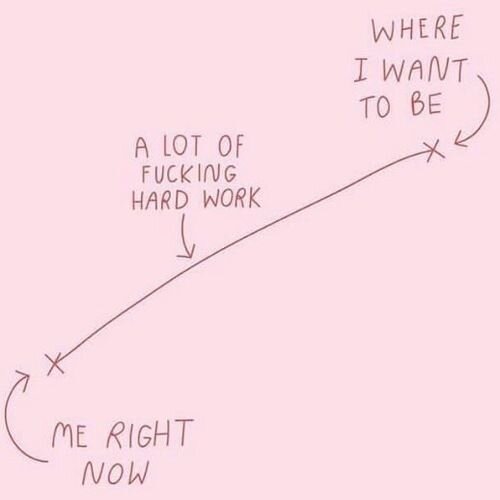The truth about eating disorder recovery
There’s a stereotype that eating disorder recovery is dainty, fluffy, and filled with affirmations and self-love. It’s filled with yoga and metaphors of blooming like a flower and finding yourself. It follows the journey of (usually) a young, thin, white girl struggling to eat peanut butter. She goes to an alternative healing centre for the length of a montage and comes back completely cured.
And it’s bullshit.
You can’t describe eating disorder recovery as some kind of rosy coming-of-age story. Eating disorders are illnesses. Recovery isn’t a story that can be neatly packaged up, tied with a bow and set aside.
I had someone once say to me that it must be nice to go to treatment. “You can just relax and not worry for a couple of weeks.” Like rehab is some kind of day spa that magically fixes you. That could not be further from the truth. Inpatient treatment was the best thing I ever did, it saved my life. But it was also the hardest thing I’ve ever done.
Treatment means you’re in a place where every single coping mechanism you have is suddenly unavailable to you. You can’t restrict. You can’t exercise. You can’t pace around to burn off energy. You need to sit with your thoughts every day, all day. You get lead through groups that make you dive into emotions that you’ve shoved aside your whole life.
Plus, you have to confront the thing your mind is convinced will kill you - food. Three times a day, plus snacks, plus supplements.
The amount of strength and resiliency that people going through eating disorder recovery have is incredible. And in no way, is it accurate to think of it as something as simple as saying a couple of affirmations and getting on with your life.
Yes, you learn about self-compassion and new healthy ways to cope. Yes, sometimes that means using affirmations and meditation. But it also means overcoming the physical urge to move 24/7, it means completely rewiring the neural pathways in your brain so you believe that food is safe again. It means scream crying in the car while you drive back from your last doctor’s appointment where they told you that, for a second time, you should take time off school and go into inpatient. It’s about getting weekly blood tests, EKG’s and medical checkups. It’s about giving into shit people spend their whole lives avoiding. It’s about continuing to eat in a culture that praises “willpower” and “skinny feels”. It’s about being still in a world that praises movement and exhaustion. It’s about being okay when ignorant questions come up around eating disorders, like when they asked you “how you did it”, “if you had any tips” or when they told you you should just eat. That will fix everything right?
The last eight years have been (ironically) consumed by a severe disorder that has led me to some of the darkest places in my life. It’s a journey I’m immensely grateful for, because it’s made me a stronger person. But what still really upsets me is the fact that I thought I was alone. I thought I was one of the only people experiencing this kind of isolated life. I can’t emphasize just how lonely eating disorders make you feel, and that’s on top of the physical complications.
On top of the shame that keeps millions from asking for help for their eating disorders, there is also the financial barrier. Eating disorder treatment is expensive, it requires access to doctors who can refer you, to employers that allow for medical leaves of absence. One paper estimated the cost of adequate treatment at approximately US$119,200 per patient - a cost that is exponentially higher than per-person treatment costs for things like schizophrenia and obsessive-compulsive disorder. A funding report from the US National Institute of Mental Health revealed that across all psychiatric conditions, eating disorder funding receives shockingly low amounts of funds. Federal support for eating disorder research equated to around US$0.73 per affected individual. For comparison, autism research was at US$58.65 per affected individual, and schizophrenia research had a rate of US$86.97 per affected individual. I am in no way trying to argue that funding for other mental illnesses should be reduced - at all. The comparison is just there to highlight the staggering funding gap that exists because of public perception of the severity of eating disorders.
Narratives that paint eating disorders as little issues that can be fixed with a bit of self-love and Pinterest quotes only make those statistics easier to process. Why put resources into something that can be easily solved by the individual? Quotes sharing messages like “just keep going” make it seem like eating disorders are personal choices. It’s not as simple as waking up and choosing that one day you’re going to recover. It’s only when we start to view eating disorders as the lethal disorders they are, will people recognize the dire need for funding.
I used to think that I was weak because I wasn’t recovering fast enough. Eight years later, I still feel embarrassed by the fact that I’m still struggling with this illness. But if I had some kind of physical illness like diabetes, I wouldn’t be mad at myself for not “getting over it” quicker.
If it’s just a matter of will, shouldn’t I be strong enough to fix it on my own?
But eating disorder recovery isn’t something that is weak. It’s something that takes immense strength. And just because some people can’t see that strength doesn’t mean it’s not valid. So to all the people going through recovery right now - I believe in you. I’m here for you. You have so many people who know what you are going through, and even though it’s hard - it is possible.
If you’re looking for resources, check out NEDIC.com
